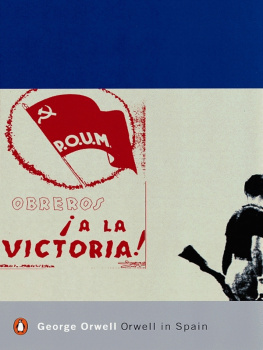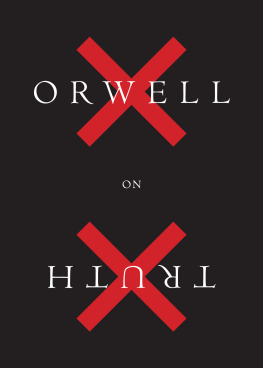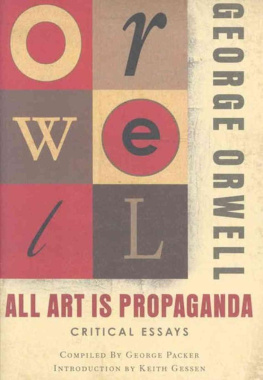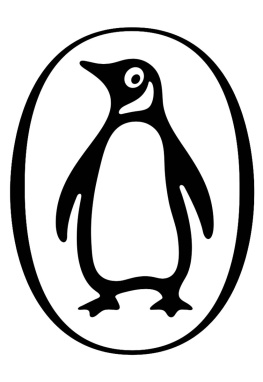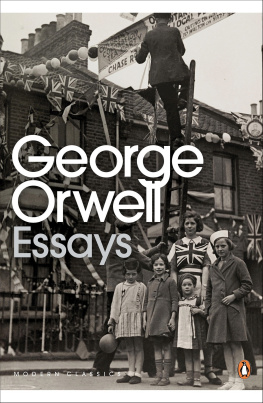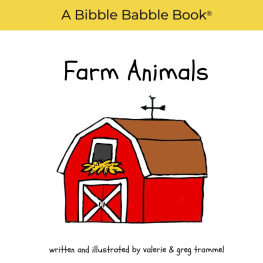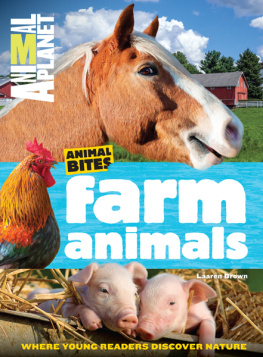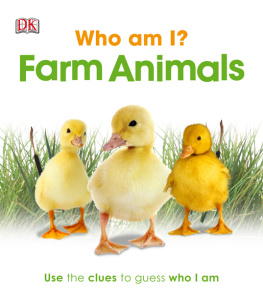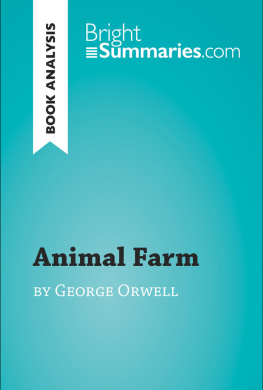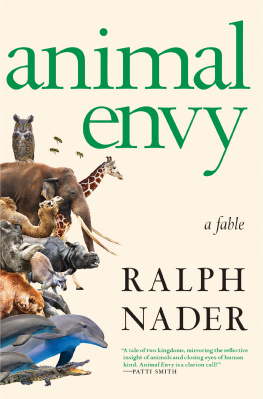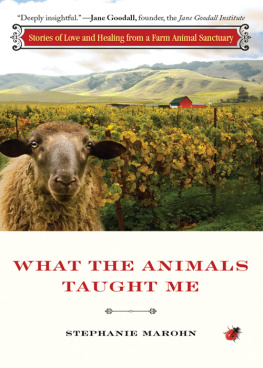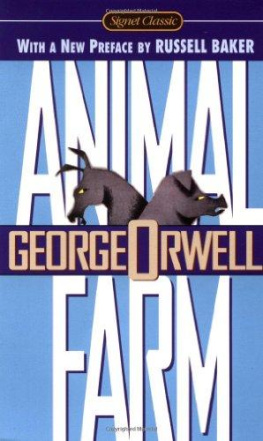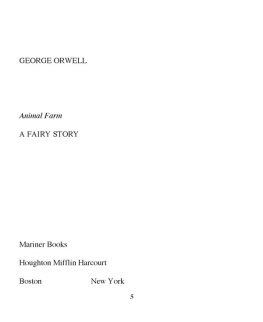H ARCOURT , I NC .
Orlando Austin New York San Diego London
Introduction copyright 2003 by Christopher Hitchens
"Animal Farm" copyright 1945 by Harcourt, Inc.
and renewed 1973 by Sonia Orwell
"1984" copyright 1949 by Harcourt, Inc.
and renewed 1977 by Sonia Brownell Orwell
All rights reserved. No part of this publication may be
reproduced or transmitted in any form or by any means,
electronic or mechanical, including photocopy, recording, or any
information storage and retrieval system, without permission
in writing from the publisher.
Requests for permission to make copies of any part of the work
should be submitted online at www.harcourt.com/contact or mailed to
the following address: Permissions Department, Harcourt, Inc.,
6277 Sea Harbor Drive, Orlando, Florida 32887-6777.
www.HarcourtBooks.com
Library of Congress Cataloging-in-Publication Data
Orwell, George, 1903-1950.
Animal farm; 1984/George Orwell.1st ed.
p. cm.
ISBN 978-0-15-101026-4
1. Domestic animalsFiction. 2. TotalitarianismFiction.
I. Orwell, George, 19031950. Nineteen eighty-four. II. Orwell,
George, 19031950. Animal farm. III. Title: 1984. IV. Title.
PR6029.R8A63 2003
823'.912dc21 2003004969
Designed by Cathy Riggs
Text set in Garamond MT
Printed in the United States of America
First edition
DOC 20 19 18 17 16 15
Introduction
T HE TWO NOVELS THAT you now hold in your hands have become "modern classics" in every sense of both those terms. They are taught in many schools as examples of moral weight and political prescience, and they are still read for pleasure, excitement and instruction even by young people who have not been subject to adult inculcation. They contain several terms and expressions"Thought Police," "Doublethink," "Newspeak," "Some animals are more equal than others"that have entered our discourse as surely as "Catch 22." (Tina Turner's album "Private Dancer" even included a song written by David Bowie entitled 1984, replete with menacing references to mind-control and cruelty, which conveyed the vague but frightening premonition of a frigidly-controlled future, as apprehended by those to whom 1984 is a date in the remote but recent past.)
In the less distant past, these books used to be banned in every country under Communist rule, and are still occasionally suppressed in the remaining single-party despotisms that disfigure the globe as I write, while Animal Farm is sometimes forbidden reading in the Islamic worldbecause of its focus on pigs. Even as I began to write this introduction, a stage version of Animal Farm was being produced by a bold theater group in Beijing, where the novel itself is still officially unobtainable.
So wide and so secure is Orwell's reputation, in other words, that it can be shocking to realise that both of his masterpieces were very nearly aborted or strangled at birth. Animal Farm was almost denied publication, and 1984 had to be finished in a terrible, desperate burst of energy on the part of a man who knew that he was dying. Probably nothing would have surprised their author more than the near-orthodox esteem in which his last two novels are now held: he never in his life expected to be "required reading" in respectable schools. The continuing censorship would have surprised him much less.
Animal Farm was written during the Second World War, at a time when London was being bombed by the Nazis and Churchill's Britain was an official friend of Stalin's Russia. Orwell despised Hitler and fascism and had fought and been wounded as a volunteer soldier for the Spanish Republic, but he chose this unpropitious moment to write a deadly satire on the illusion of Soviet Communism. The original manuscript had to be dug out, in a somewhat scorched and crumpled state, from the ruins of Orwell's blitzed North London home. In this condition, it was sent to T. S. Eliot, the author of The Waste Land, who occupied the extremely influential position of editor at Faber and Faber. Eliot was a political and cultural conservative of the determined Right, and might have been presumed sympathetic to an anti-Stalinist project. But he turned the book down in a letter of extreme condescension which described it as "generally Trotskyite."
This was, bizarrely enough, the same objection that had been made by Orwell's leftist opponents. A senior official in the British Ministry of Information named Peter Smollett made it his business to warn publishers against accepting the book. His ostensible rationale was that Josef Stalin was an ally of Great Britain, and that it would be tactless to publish a satire upon him. The likelihood that the Red Army would have stopped fighting Hider in 1944 for this reason was clearly not very great, but conformist and loyalist opinion is always easy to elicit and the evidence that publisher Jonathan Cape, for example, dropped the book on Smollett's instigation is very strong. (Smollett himself was later exposed as an agent of the Soviet secret intelligence, whose job was to defend the prestige of Stalinism rather than to support the war effort.)
Other publishers like Victor Gollancza leftist sympathiser who had printed earlier Orwell worksneeded no persuasion in denying him an audience for the twentieth century's most successful satire. In the end, the small house of Seeker and Warburg agreed to publish Animal Farm in a very small edition, for an advance of forty-five English pounds (or $2,020 expressed in today's value).
However, a group of Ukrainian socialists, living in refugee camps in post-war Europe, got hold of a copy of the book and immediately understood its profound relevance. They contacted Orwell, who agreed to write the only introduction to Animal Farm that he ever composed, and who gave them the right to reprint the work in the Ukrainian language, for free. This edition was distributed among refugees in Germany, but most copies were seized by the American military authorities (this, well after the war against Hitler was over) and handed over to the Red Army to be burned.
In the United States, the book fared somewhat better. Though it was originally refused by the Dial Press on the absurd grounds that animal stories did not sell well in America, and though it was declined by Angus Cameron of Random House after Arthur Schlesinger, Jr., had sent him a copy (Cameron was a leading Communist fellow-traveler), it did eventually see print, from Harcourt, Brace, in 1946. By that time, Orwell had only a few years to live and was to exhaust himself physically and mentally by writing and then typing out 1984. The contrast between the two books is an extraordinary one, which partly reflects Orwell's own race against time.
Animal Farm, with its original tongue-in-cheek subtitle "A Fairy Story," is biting but essentially good-natured. The pastoral setting has a reassuring patina; Mr Jones, the wicked farmer, is also a figure of farce. The fate of some creatures, most obviously the noble work-horse Boxer, has additional pathos and tragedyin Boxer's case because of his dumb, equine braverybut the pigs are the pigs and they are amusing as well as nasty in their anthropomorphism. (Many children have enjoyed the book for its own sake, heedless of the history of the Soviet Union and its ruthless, witless collectivisation, and Martin Amis in Money has a hilarious passage in which his dumb-ox of a narrator, John Self, is given a copy of the novel and laboriously makes the self-same mistake.)
In 1984, by contrast, Orwell made extensive and almost melodramatic use of his own buried knowledge of cruelty. In his life, he had witnessed sadistic and authoritarian behavior among small boys at English boarding-schools, again while serving as a policeman in colonial Burma and further as a journalist pretending to be a loser in slums and sweatshops. He had also gained first-hand experience of political terror as a fighter against both fascism and Stalinism in Spain. The novel makes a double-distillation of every nightmare of monstrous entrapment and powerlessness to which the average human brain is vulnerable. It also makes an almost conscious attempt to destroy the very concept of hope. Those who read it first, like its original publisher Fredric Warburg, were made physically afraid. I still come across students in their twenties who were terrified by their initial reading.
Next page

